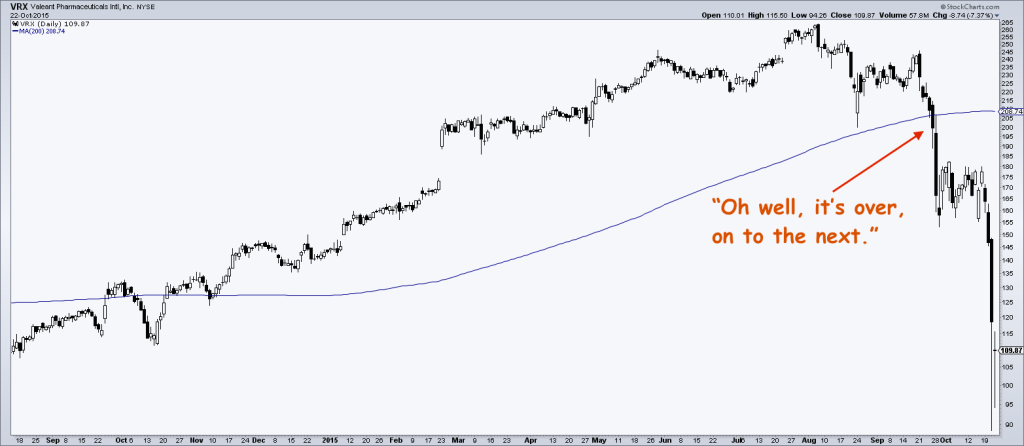Trading stocks for yourself allows a certain degree of freedom that managing portfolios for others never allows. Joshua Brown explains.
Where traders sold Valeant
Courtesy of Joshua Brown
This is where I think traders sold Valeant:
Not at the high, mind you, but on the way down before it went, well, waaaay down. I can’t imagine anyone who’s trading their own money professionally or semi-professionally is actually still long this stock. They can’t possibly be.
Professional traders are not in the “I want to be right” business, they’re in the capital preservation business. Either that or they face involuntary retirement. When a stock is going up, traders are happy to ride along. When it stops going up, traders get out.
For portfolio managers, it’s different.
They learn everything there is to know about the company and read all the research. They conduct their own research. They get introduced to management by the institutional sales-traders who have been turned into matchmakers and concierges in the modern era. When a stock they’ve learned about goes down, they buy even more. They stick to their guns and make some phone calls. They get the “reason” why the stock is down and decide it’s overblown. They talk to their own investors about the “opportunity” the market has created.
Both can be right on different timeframes.
The difference is, the trader doesn’t let herself get associated with a certain position or be forced to explain why her original bullishness is still justified. She sells a stock as it breaks down and, in most cases, forgets all about it. A portfolio manager who’s come out publicly with a positive opinion on that stock doesn’t have the luxury of moving on without losing face in front of investors.
“Who cares what the investors think, cut your losses!” you might be saying.
OK, sure, but not as easy in practice. Because now there is doubt in the minds of the PM’s investors and the leash gets tightened a bit. There is less latitude for future risk-taking now and maybe a couple of dollars of redemptions. The magic man has lost his touch, they’ll whisper.
Optics and career risk are a factor, even though they have nothing to do with whether or not a position should be held or sold.
Here are three small hedge funds that had massive concentrated bets in Valeant this year. They were up huge on the trade and now they’re most likely down huge, in very short order. Can they admit they were wrong and move on? Will they lose fund of funds money in the process?
Running money publicly and going on the record with investors about individual stocks is really difficult. It introduces new elements of difficulty into an already difficult game. Traders on their own, reporting to no one else, don’t have nearly as much trouble exiting a losing situation.




